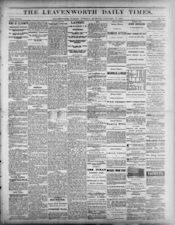Daily Times [Leavenworth, KS], December 1, 1860
There is a wide difference of opinion among the Eastern journals concerning the character of Montgomery and his followers.—On the one hand, they are regarded as men actuated purely by principle, and governed only by philanthropic motives; while, on the other, they are stigmatized as pirates, bandits and robbers. We believe that neither of these estimates of them is a correct one.
Capt. Montgomery is said, by those who know him, to be a man of strict integrity, and possessed of many good qualities. He suffered injuries from the pro-slavery party, during the early conflicts in Kansas, which so intensified his hostility to the “institution,” that he now seems disposed to retaliate upon everyone who apologises for, or defends it.—He deals largely in scriptural quotations, and the influence which he has over some of his men is attributed to a sort of superstition which they entertain for him, as a religious enthusiast. Of course, many of those he has gathered round him partake of his own nature.—They appear to be ever ready to rush to arms for the redress of their grievances,—real or supposed,—and shout, “The sword of the Lord and of Gideon.” They are infatuated zealots,—earnest and honest, but willing to adopt almost any means for the accomplishment of their purposes.
While this is true of a portion of Montgomery’s band, it is certain that there are numbers of them, whose sole object is plunder, and who are controlled by the lowest instincts and purposes.
But, no matter what may be the character of these men, we cannot excuse their recent transactions. They may be all that is claimed for them, and yet the course which they have pursued is unjustifiable.
Even though their intentions be entirely pure and unselfish, the mad schemes which we have reason to believe they have concocted, can only injure and retard the anti-slavery cause. Lord George Gordon, though a fanatic, was sincere; yet the wild outbreak which he incited, brought disgrace upon Protestantism, the interests of which he meant to subserve. Peter the Hermit thought he was doing God’s service when he became a leader in the Crusades; yet their history is an evidence of the folly and madness of him and his associates. John Brown believed that he was doing his duty when he projected his raid into Virginia; yet of that affair and its author Senator Seward truly said,–“While generous and charitable natures will probably concede that John Brown and his associates acted on earnest, though fatally erroneous convictions, yet all good citizens will nevertheless agree that this attempt to execute an unlawful purpose in Virginia, by invasion, involving servile war, was an act of sedition and treason, and criminal to just the extent that it affected the public peace, and was destructive of human happiness and human life.”
Let us not be understood to intimate that anything has yet transpired in Southern Kansas bearing a comparison with the historical events to which we have referred. We allude to them merely to show how the best motives may inspire the most disastrous enterprises.
However excellent may be the intentions of Montgomery and his men, their actions are fraught with dangerous consequences, and can neither be excused nor tolerated.
